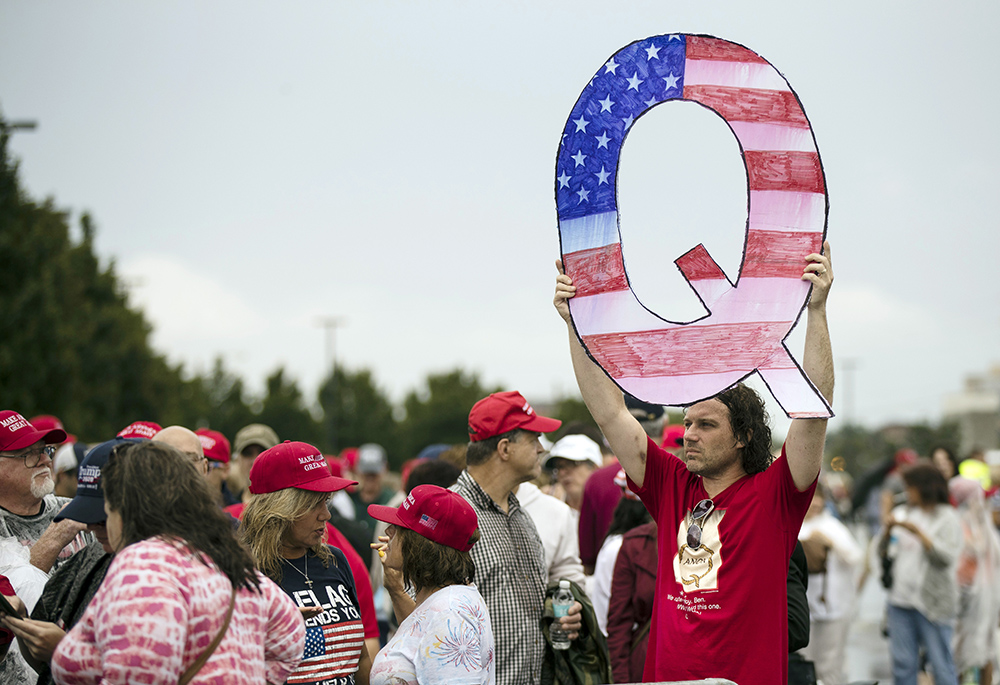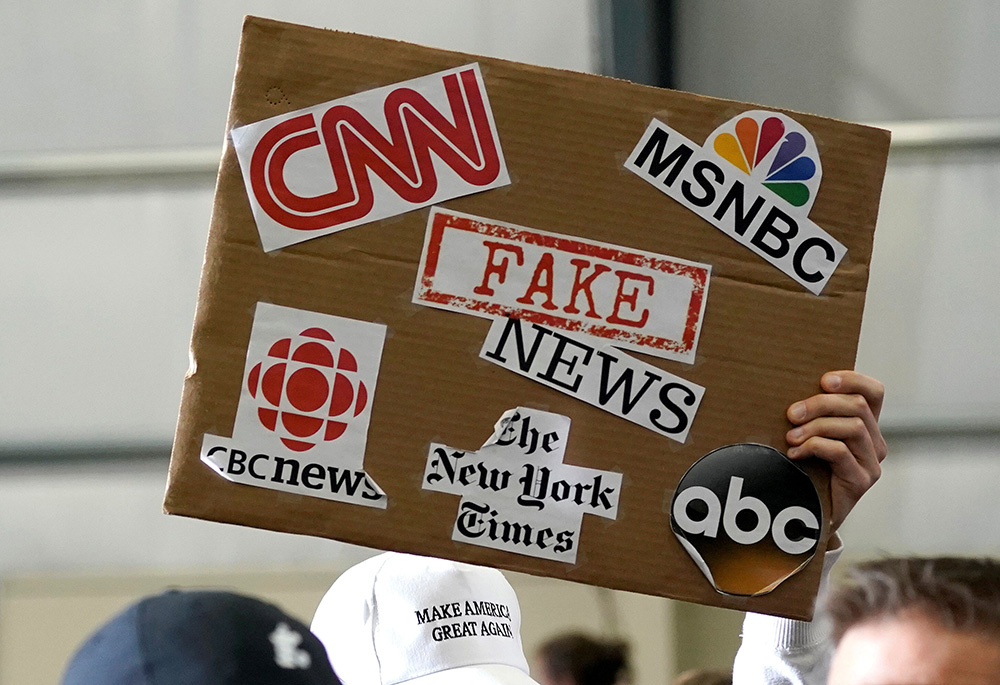
In this Aug. 2, 2018, file photo, a protester holds a Q sign, referencing the fringe conspiracy theory known as QAnon, as he waits in line with others to enter a campaign rally with then-President Donald Trump in Wilkes-Barre, Pennsylvania. (AP/Matt Rourke, File)
Lately, in my work as a conflict facilitator, I've noticed a trend about the question of "truth." Of course, every conflict is rooted in questions of "truth" — what makes a situation difficult in the first place is that the parties involved hold different pictures in their minds about what is going on and what it means. Parties frame these as questions of "truth."
Yet most conflicts are not really about "truth" — at least not in the way we think they are. As a rule of thumb, both parties agree on the basic facts of the situation. What they disagree about is which facts matter, which ones are more relevant, what we should do about the facts.
A couple of years ago, however, I began to see situations where it wasn't merely a matter of perspective concerning the facts, but disagreement about the facts themselves. I began to hear stories of not only fellow co-workers and congregants, but also longtime friends and beloved family members unable to find sources of information that both would find trustworthy. I was witnessing the early signs of a different sort of pandemic — a conspiracy pandemic.
Now questions about conspiracy thinking come up in almost every conflict workshop that I offer: QAnon, the origins of COVID-19, the safety of vaccines, the stolen 2020 presidential election, the purpose of 5G. Occasionally even the Flat Earth Society makes a reappearance.
What links these disparate narratives is a common disregard for widely available factual data and an overemphasis on data that is missing or limited in scope. Conspiracy thinkers believe in their own capacity to discern information and perceive patterns of connection that others can't see, while their counterparts feel angry and exhausted at the very prospect of trying to have another conversation that — based on previous experience — will go "absolutely nowhere."

St. Thomas Aquinas is seen in stained glass at the Basilica of Our Lady of the Immaculate Conception in Guelph, Ontario. (CNS/The Crosiers/Gene Plaisted)
The situation alarms me as a conflict facilitator, but also as a theologian and faculty member at Aquinas Institute of Theology, where we steep ourselves in all things Dominican, especially of course the thought of Thomas Aquinas. In the dead of night I can sometimes hear Thomas as if through a bullhorn wanting to wake all of us up to the dangers of this phenomenon and the urgency of some sort of coordinated response, not just as a nation, but as a church. I believe he would see conspiracy thinking as a matter of concern not only politically — pertaining to the health of our common life with one another — but in terms of faith.
It is from Thomas' Summa Theologiae that we derive the classical dictionary definition of truth as "the adequation of thing and intellect." More simply, truth is having a picture of the world in your mind that aligns with how the world really is. In contrast to some Eastern spiritual traditions, Western Christianity understands the world as existing on its own separate from our minds and regardless of what we believe about it. So either the climate is slowly warming or it is not slowly warming, but whether it is warming or not is not dependent on me believing it is. Either Joe Biden received more votes or Donald Trump did, but me believing one way or the other does not change the actual number.
Our beliefs do matter, however, because they motivate our actions. It is in our own best interest to make sure our minds align with reality, or our choices will be poor ones. I may not believe in gravity, for example, but if I jump off my apartment balcony, I'm going to hit the ground at the same speed as someone who does. It is not reality that is in danger. It is me.
Many conspiracy theories seem fairly innocuous. Is anyone really the worse off if I don't believe Apollo landed on the moon? Does even Paul McCartney care that I think he actually died in 1966? Why be concerned? Two reasons. First — on a theological plane — as Christians, we reverence "Truth" and "Ultimate Reality" as names for God and any time that we have a picture in our mind that is less true than it could be — even around the fate of a Beatle — we are also one step further from God than we could be. Conspiracy thinking has spiritual consequences, even if sometimes subtle ones.
But I concede this big-picture theological concern can sound a bit esoteric. So let me name the more immediately worrisome one: Across history, many conspiracy theories that perhaps seemed inconsequential at first have led to horrendous results. The obscure 1905 "Protocols of the Learned Elders of Zion" book asserted a Jewish conspiracy to achieve world domination. Three decades later it was used by Nazis to justify Jewish genocide. The denial of the existence of AIDS in the 1980s by the government of South Africa contributed to hundreds of thousands of unnecessary deaths. Current disinformation campaigns about COVID-19 vaccines have already contributed to unnecessary deaths as well. The very real impact of conspiracy theories makes them not only spiritually but morally troublesome.
As a church we need to treat conspiracy thinking with the same vigor as other significant moral issues of our time, such as immigration policy, abortion, racism and human trafficking.
Aquinas would note that if we are genuinely misled by information and believe it to be true when it is not, there is no sin involved. We are simply in the very unfortunate state of error. But if we know the information to be fictitious and nevertheless assert that it is true, then we are lying and in a state of sin. Moreover, if others have tried to point out to us that we are mistaken and we refuse to receive more accurate information when we could do so as creatures gifted with reason, we are culpable of the sin of "vincible ignorance" — a term from the past that we probably need to take out of the closet and dust off.
As a church we need to treat conspiracy thinking with the same vigor as other significant moral issues of our time, such as immigration policy, abortion, racism and human trafficking. Pope Francis regularly confronted disinformation about the COVID-19 vaccine in his preaching this past year. And his annual World Communications Day messages have been consistently strong in raising alarm about "fake news," especially on social media.
Parishes and dioceses could be doing much more to take on conspiracy thinking as a moral crisis. Possibilities include bulletin articles, preaching from the pulpit, faith formation opportunities on media literacy, book studies and discussion of films like Netflix's The Social Dilemma. Making headway on this issue is going to require coordinated, sustained effort as a community dedicated to truth. It is more than any one of us can take on individually. And yet, at the same time, each of us hungers to figure out how to deal effectively with the situation in our own personal relationships.
So, what can we do as people who are committed to truth and, at the same time, to "loving our neighbor"? A few tips from the field of conflict studies could help, even if they may not produce the immediate solutions we hope for.

A sign showing major news organizations along with the words "fake news" is held up as then-U.S. President Donald Trump speaks at a rally in Washington, Michigan April 28, 2018. (CNS/Reuters/Joshua Roberts)
First, recognize that conspiracy thinking is not something unique to the left or the right, the young or the old. It is not particular to race or religion, socioeconomic class or even degree of education. As an academic, I know that I am tempted to hold in high estimation my own capacity to discern information and perceive patterns of connection that others can't see. Realizing the desire to "know" shares a border with a desire to be "in the know" can give us greater empathy. Truth is not an easy thing to discern and, while there are no such things as "alternative facts" from a Thomistic mindset, there are almost always going to be such things as "additional facts." None of us yet has a mind entirely aligned with reality. So we can acknowledge the pursuit of truth is a universal struggle and journey.
Second, consider the purpose of your conversations. We generally participate in conversations about conspiracy theories with the goal of changing the other person's mind and helping them to "see the light." Yet if we only consider as successful discussions that result in the other changing their view, we are setting ourselves up for frustration and failure. Instead, we should embrace more manageable goals.
What can we reliably achieve in any conversation? We can always learn more about what the other believes. We can ask questions about their view, not with the intention of being converted to it ourselves, but with the goal of figuring out why this story is compelling to them. I sometimes imagine myself in the role of a journalist, asking questions to make sure I have their story clear enough that I could summarize it back to them in such a way they would be able to nod and agree, "Yes, you heard me."
This is important because while people rarely change their minds about their convictions, they never change their minds if they feel belittled or dismissed. Persons who feel they are not being taken seriously are likely to become more entrenched in their patterns of thought, not less.
Another way to help persons feel respected and heard is to acknowledge their feelings. Acknowledging feelings is, again, not the same as agreeing with the other person's story but noting that underneath their conspiracy beliefs are often strong emotions of fear, anxiety, even despair.
For example, "It sounds like you are really worried that being vaccinated might affect your ability to have children in the future" or "I hear underneath what you are saying a grave fear for the future of our country — that it might become a place where your voice no longer counts."
Even if we cannot for the sake of truth share their narrative, we do often share their feelings, and this can provide a point of connection: "I, too, feel a lot of anxiety right now. I, too, want our children — including those not yet born — to be healthy. I, too, want our country to have a future."
Advertisement
Finding common ground at the level of emotion can also provide a potential bridge to share our own perspective. It may sometimes be helpful to identify briefly why you are not persuaded by their theory. For example, "Here's what I've been hearing that is most persuasive to me … " or "I think what has persuaded me to think differently is … ". At the same time, it is not helpful to get locked into a "battle of the facts" because this is where the conversation is most likely to get stuck. Possible shifts to keep the conversation constructive include:
- Inviting intellectual humility and reflection on sources of information: "Neither you nor I are scientists/doctors/polling officials and we are not going to be able to sort this issue out once and for all on our own. The best we are going to be able to do is make sure that we've checked out the quality of the sources we are using to inform our perspectives. I've been getting my information from ____ and ____ because … ".
- Naming your own feelings about the conversation itself and the impact the conversation is having on your relationship: "I'm frustrated because we keep getting into the same conversation over and over again and it's not changing either of our minds but it does feel like it's hurting our friendship. I'm worried because I care about you and I care about our wider family. I'm scared our differences on this matter are becoming a rift we won't be able to heal."
- Inviting strategies for moving forward in your relationship: "I know we've gone in circles on this topic and unless some major new information comes forward it's probably not helpful to keep revisiting it. Maybe the bigger question is how we want to still be sisters when we think so differently on this topic. What commitments can we make to each other?"
A commitment to truth is fundamental to our lives as Christians. We witness to this by trying to always make sure that our own minds are aligned with reality. At the same time, we witness our commitment to truth by the way that we choose to "be true" to one another even in situations marred by untruth. Sometimes we might need to set boundaries on what conversations we are willing to have repeatedly. During a pandemic, we might need to create physical distance from one another for safety's sake.
But we can also work to keep bridges of care for one another open — talking about other topics, engaging in common activities when talking isn't working, gift-giving, acts of service toward one another. Although perhaps not as well known as his writing on truth, Aquinas' comments on "pietas" — or what we owe our kin and "countrymen" — may be relevant during this tough time: Our religious devotion to truth can't erase our devotion to each other.
And, hopefully, our ongoing devotion to each other will make possible what all of our rigorous debates have not. Thomas reminds us that it is only God that can lead a person's mind toward greater truth. It's only by the gift of grace that anyone experiences conversion. But when we work together to form a circle of both concern and compassion around persons with conspiracy thinking, we are working as God's eyes, mouth, hands, feet. And, perhaps not immediately, but eventually, truth wins out.








